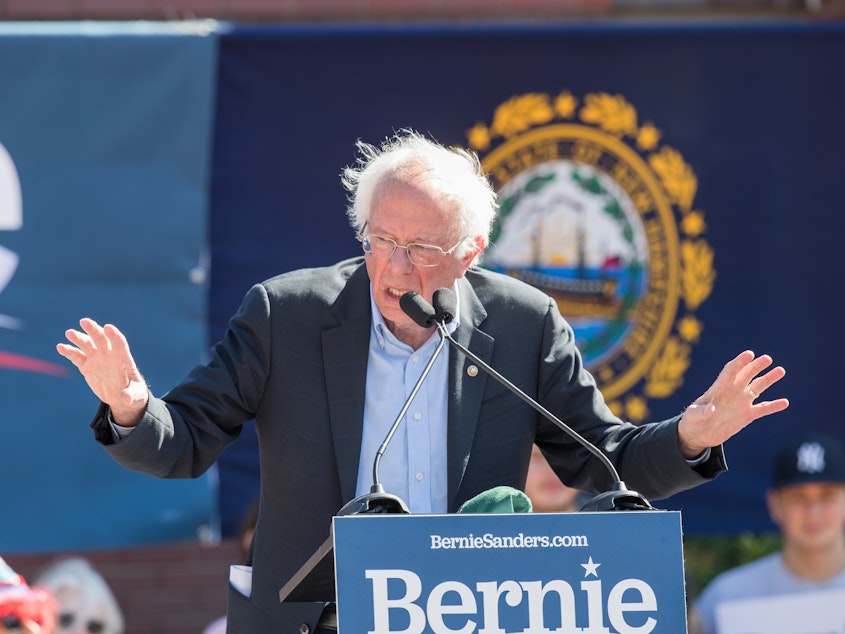Wealth Tax Showdown

"I don't think that billionaires should exist," Senator and presidential candidate Bernie Sanders said last week. And he's now proposed a way to get rid of them: his version of a wealth tax on the .1% richest families in America.
Editor's note: This is an excerpt of Planet Money's newsletter. You can sign up here.
A wealth tax is like a property tax, but, instead of just taxing real estate, it taxes everything a person owns. The policy, aimed at reversing runaway inequality, would be new for the U.S. federal government, which typically taxes only income and estates. Like other wealth tax proposals on the table this election, Bernie's "Tax on Extreme Wealth" faces major obstacles, including questions about its efficacy and whether or not it's even permitted by the Constitution.
Boss Tax Battle
Sanders proposal comes almost a year after Senator Elizabeth Warren released her own wealth tax proposal — an "Ultra Millionaire Tax" — which has since become one of her marquee policies. Bringing up the tax at a campaign event in Washington Square Park last month, Warren was interrupted by an excited crowd, chanting "two cents, two cents, two cents."
Sponsored
"Yes, that is a two cents tax on fortunes over $50 million," Senator Warren responded, turning to what's become a reliable talking point. Warren takes pains to paint her wealth tax as modest. She doesn't say she wants to eradicate billionaires. She just wants us to dip into their fortunes; an annual tax of "just two cents" on every dollar above $50 million and "three cents" on every dollar above $1 billion.
Bernie's policy goes much further. It starts lower, beginning with a one percent tax on every dollar of a married couple's fortune over $32 million. It then goes up, two percent on fortunes between $50 and $250 million, three percent on $250 to $500 million, and up and up until it hits eight percent on all wealth over $10 billion.
It may sound like nothing, but consider that if invested prudently, wealth, on average, grows about six to eight percent per year. To use Warren's framing, you could say it grows only six or eight cents per dollar per year.
Under Bernie's proposal, if you're a billionaire, and you want to get richer, you're either going to have to be a financial genius, extremely lucky, or have really good accountants and lawyers to even just maintain your level of wealth. The tax, if effectively enforced, would eat fortunes. Jeff Bezos, for instance, would pay around $9 billion this year under the plan. Unlike Warren's proposal, Bernie's policy wouldn't just slow the growth of wealth at the top. It would essentially stop it.
Bernie's team estimates the policy would slash billionaires' fortunes in half over the next 15 years and raise $4.35 trillion over the next decade. Warren's team says hers will raise $2.75 trillion over the same period. Like Warren, Bernie doesn't have any issues figuring out how to spend the money. His campaign says it will "be used to fund Bernie's affordable housing plan, universal childcare and would help fund Medicare for All."
Sponsored
Will it Work?
A few months ago, Planet Money made an episode on the subject of wealth taxes. The policy has been tried many times before overseas. It hasn't worked out well. (You can also read our past Planet Money newsletter about it here ). Wealth taxes were difficult to enforce, encouraged rich people to move their wealth out of the country, hurt the economy by distorting investment decisions and, in the end, they didn't accomplish their main goal of raising lots of revenue.
To combat the problems seen with wealth taxes overseas, Bernie's Tax on Extreme Wealth calls for expanding the role and power of the federal government. It calls for a "national wealth registry" and a major expansion of the IRS. And it includes an "exit tax," which would confiscate 40 percent of a rich person's wealth under $1 billion and 60 percent over $1 billion if they renounce their citizenship and try to escape the tax.
Even if not implemented, Bernie's wealth tax could have one large unintended consequence: It makes Warren's wealth tax look moderate.
Did you enjoy this newsletter? Well, it looks even better in your inbox! You can sign up here. [Copyright 2019 NPR]



